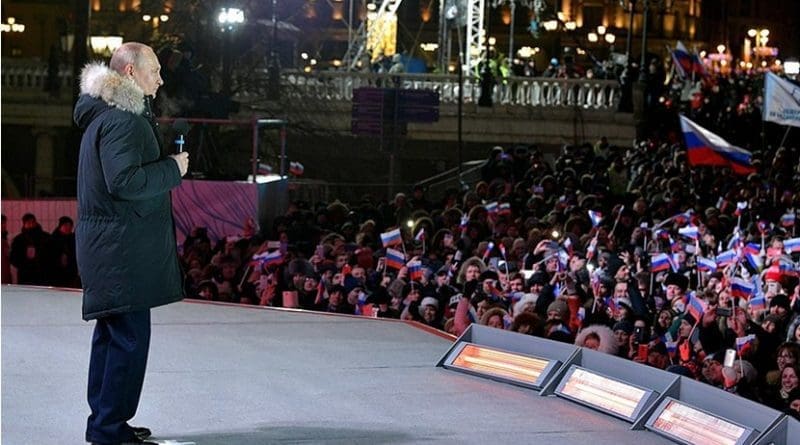Economic Challenges Loom At Dawn Of Fourth Putin Era – OpEd
By Arab News
By Cornelia Meyer*
Vladimir Putin began his fourth term as president of the Russian federation on Monday. The dawn of Putin 4.0 was met with protests and demonstrations across the country, with around 1,600 arrests — the most notable being that of opposition leader Alexei Navalny.
There is widespread discontent within Russian civil society at the prospect of another six years of rule by Putin, who has already governed the country for longer than any leader since Joseph Stalin. Apart from objecting to growing restrictions on civil liberties, there is widespread anger at the disproportionate share of wealth being concentrated in the hands of the ruling elite in the president’s circle.
Putin made big economic promises during the election campaign, vowing that investment would flow into hard and soft infrastructure, including education and health care. But will the state of the Russian economy allow him to deliver on his pledges?
The sharp decline in oil prices, together with sanctions imposed on the country on the wake of its annexation of the Crimea from Ukraine in 2014, pushed the country into recession in 2015 and 2016. Higher oil prices and growing macroeconomic stability helped the country return to a growth of 1.5 percent last year; but such growth is nominal only, with inflation, though falling, still outstripping growth.
The World Bank forecasts the country’s GDP will rise 1.7 percent this year, still trailing the rate of inflation.
A new round of US sanctions, launched last month, froze the assets of seven oligarchs and 12 companies. The announcement triggered a depreciation of the rouble by 10 percent in the span of a few days, spelling more inflationary trouble. Inflation always hits the less affluent harder than the wealthy, which in turn puts additional political pressure on Putin.
On the other side of the equation, the impact from sanctions has been softened by the recovery in oil prices, from below $30 a barrel in early 2016 to above $75 yesterday. The rise was prompted by Russia’s landmark deal in late 2016 with OPEC members and other producers to trim daily production by 1.8 million barrels, which has successfully all-but wiped out the global crude inventory overhang.
Higher oil prices have helped Russia’s current account surplus grow to around $29 billion at the end of the last quarter, which places Russia in a better position to weather emerging markets turbulences than countries with structural account deficits such as Turkey or Argentina.
But while higher oil prices have softened the impact of Western sanctions, such penalties are still driving inflation and are not good for economic growth. In the longer term, Vladimir Putin faces the challenge to diversify Russia’s economy away from over reliance on oil, gas and other commodities, which constitute a disproportionate share of exports and GDP.
The high oil price may give him air cover for the time being. He can’t, however, rely on commodities to save the day in the long run, with recent history a reminder of their inherent price volatility. He will need to fill the coffers of the finance ministry to deliver on his election promises and to fight his wars in the Middle East.
There’s an urgent need to invest particularly in Russian infrastructure, manufacturing and agriculture, because that is where the jobs are. Unemployment currently stands at around 5 percent.
In response to sanctions, Russia is realigning its trading relationships, with China gaining an ever-greater share in terms of exports as well as imports. Russia has finally built a pipeline infrastructure to the East enabling hydrocarbon exports to the Middle Kingdom.
At the same time, many European countries, especially Germany, will try to find an accommodation of sorts with Russia even amid the new sanctions, given their dependence on gas imports from the country. It’s no coincidence that Germany’s former chancellor Gerhard Schroeder sits on Russian gas giant Gazprom’s board.
But a diversification of trading partners will in the end not compensate for economic setbacks caused by sanctions. In the meantime, President Putin would be well advised to stay in the OPEC- non OPEC ~agreement of co-operation, because that is his best bet to keep the oil price at acceptable levels for the time being.
- Cornelia Meyer is a business consultant, macroeconomist and energy expert. Twitter: @MeyerResources

